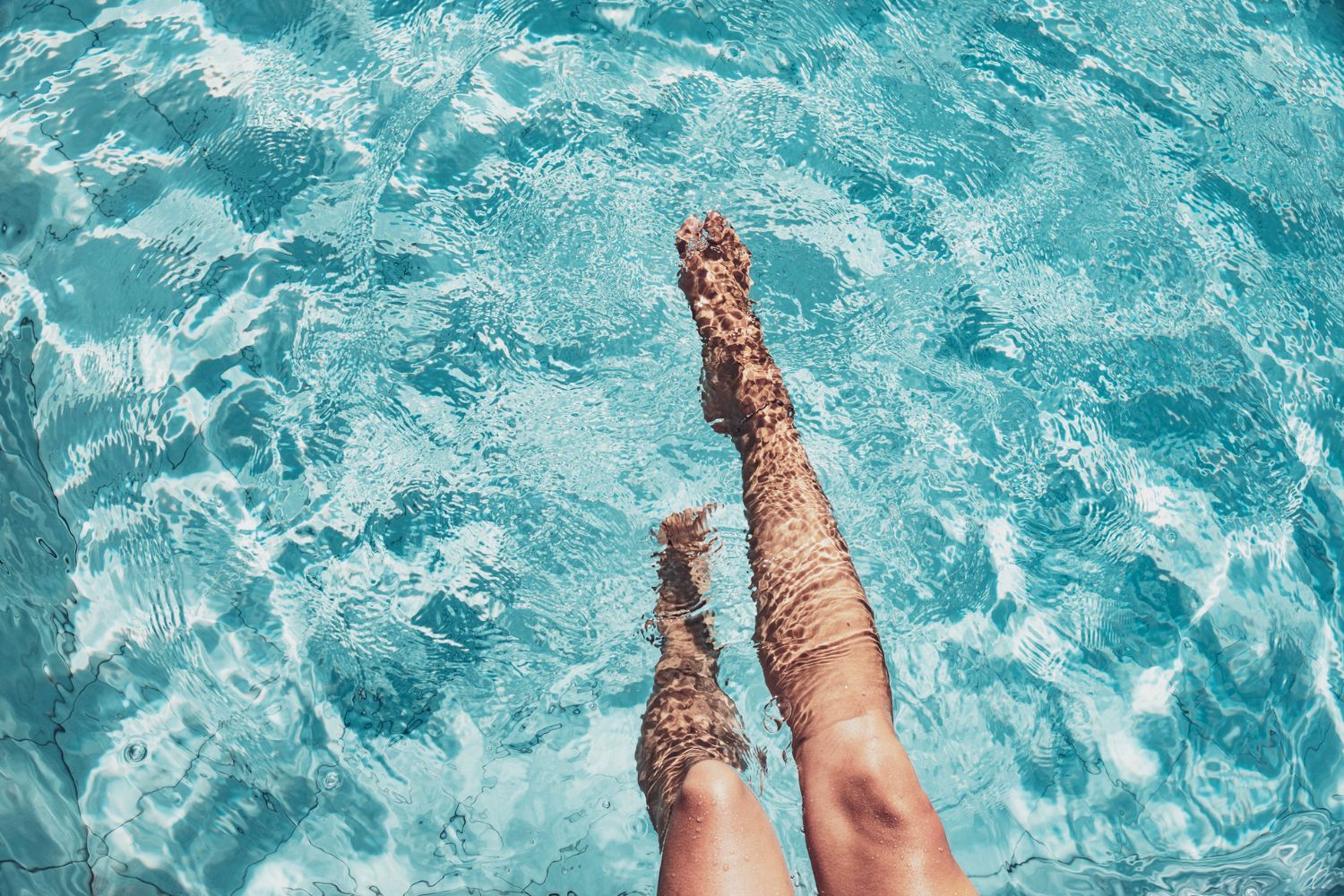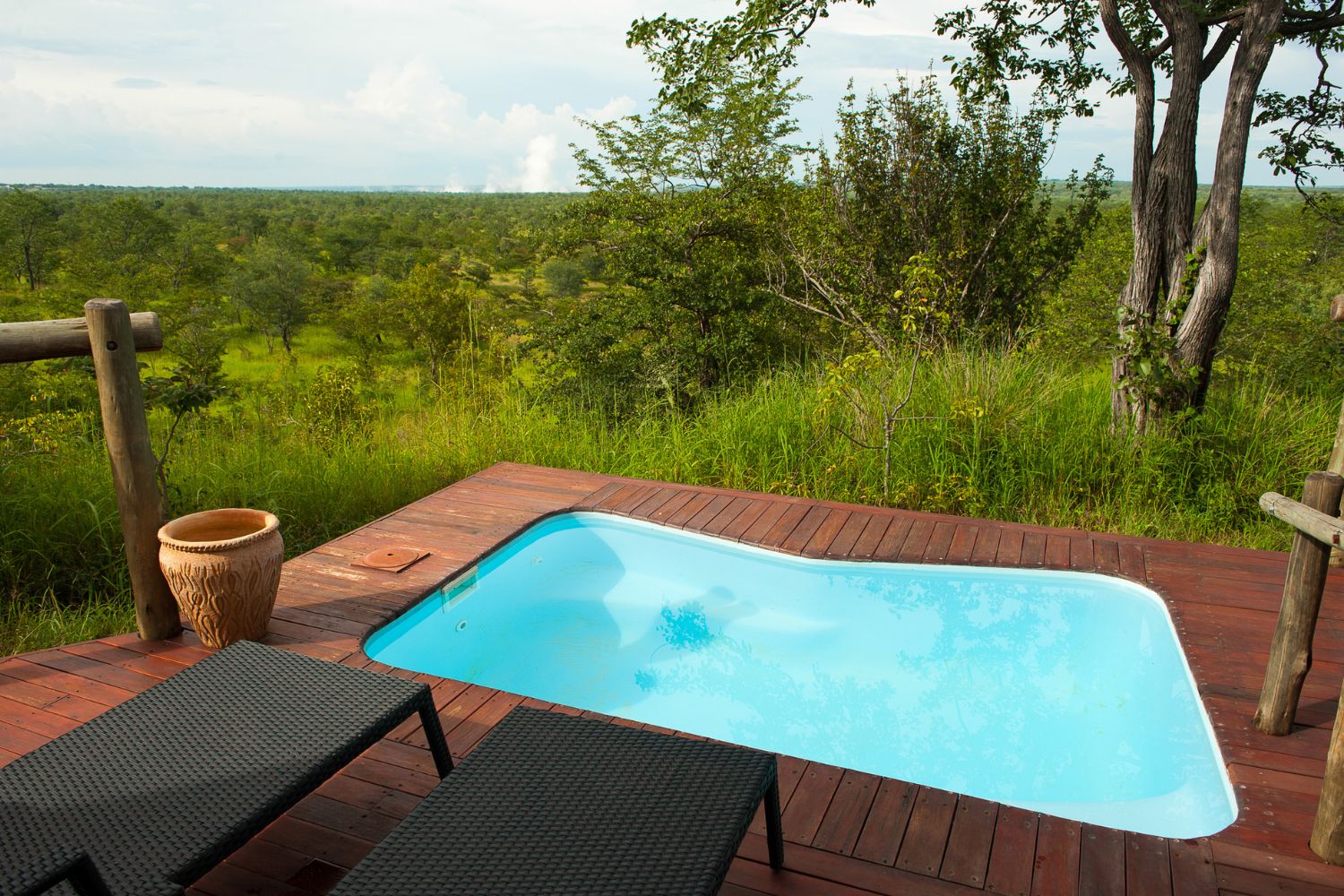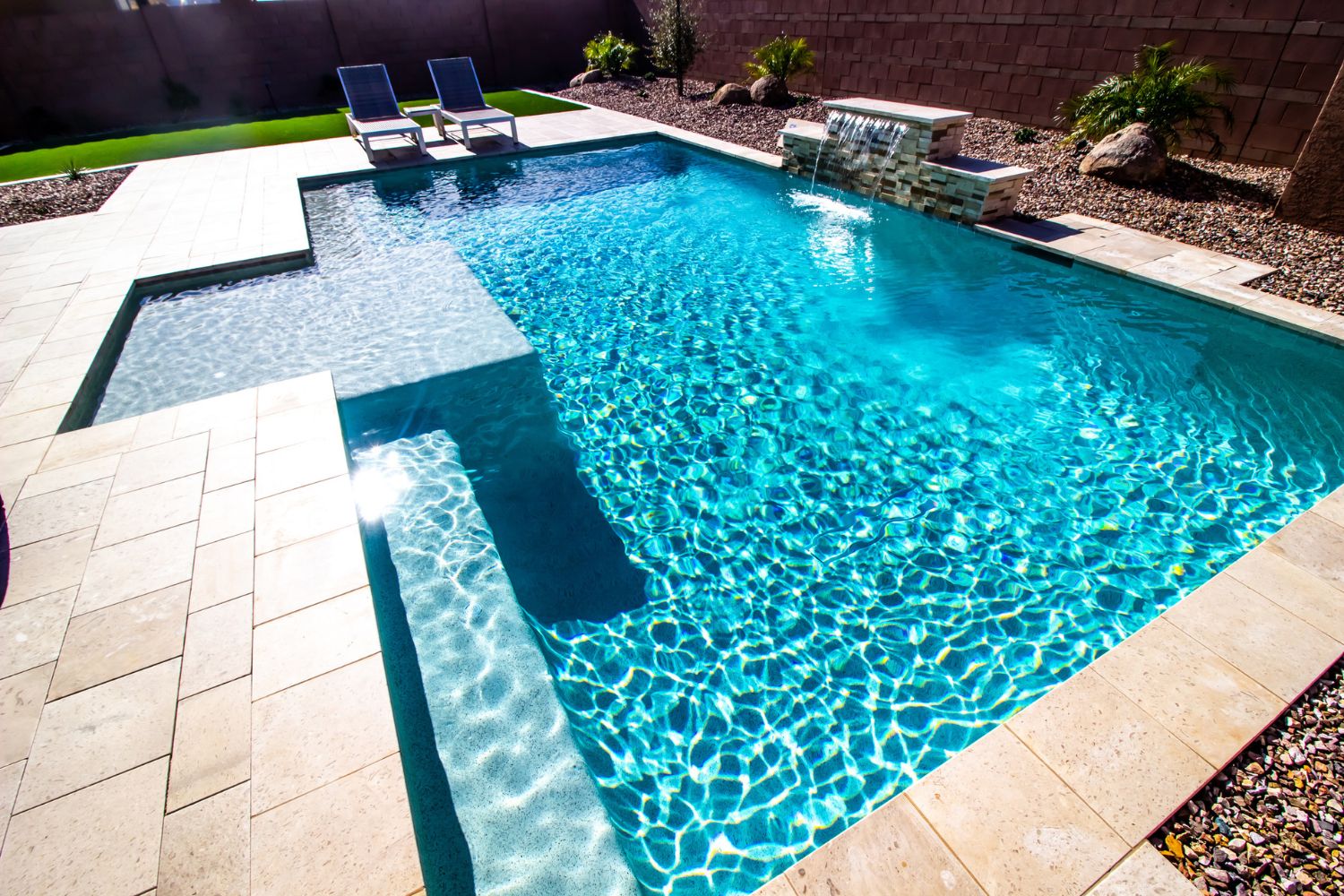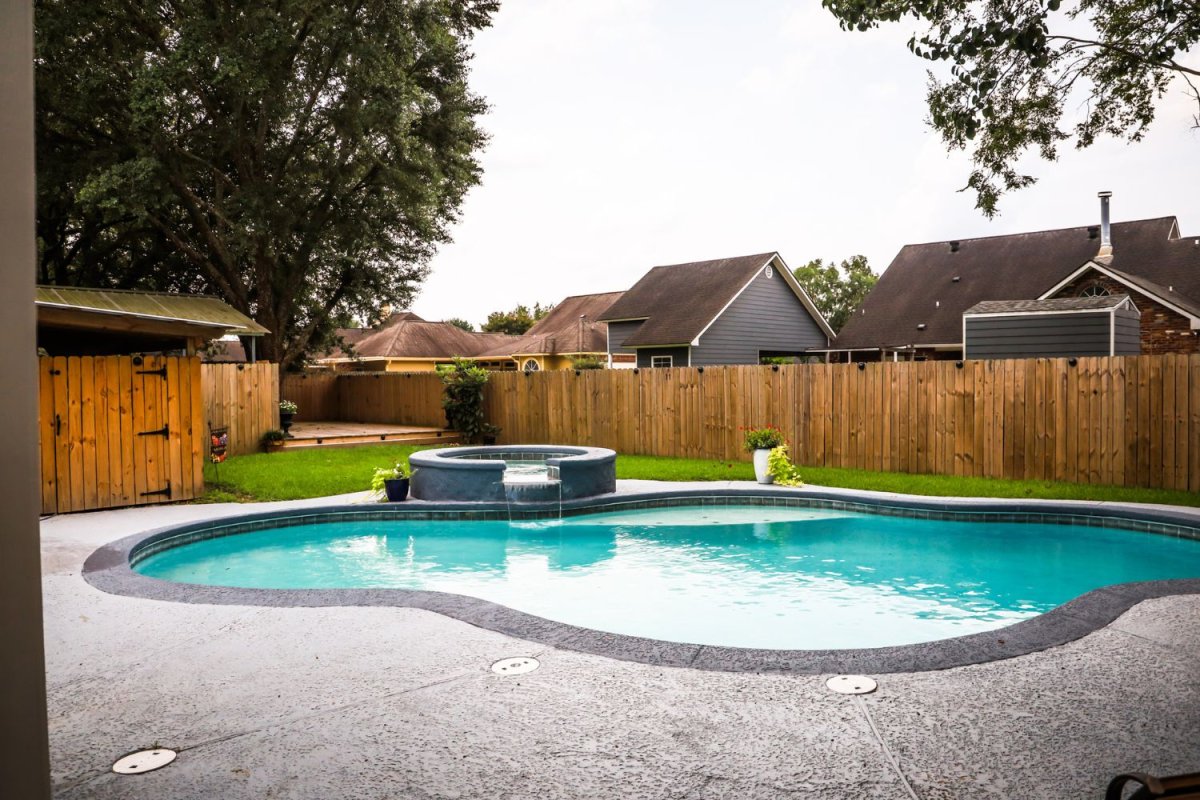We may earn revenue from the products available on this page and participate in affiliate programs. Learn More ›
- Typical Range: $10,000 to $50,000
- National Average: $20,000
Owning a pool is a dream for many, but what if there isn’t enough room to install a standard-size pool? Many homeowners with small yards opt instead for a plunge pool to cool off during the hot summer months. Less expensive than the average cost of an inground pool (though more expensive than the cost of an above-ground pool), plunge pools (sometimes called cocktail pools) are just deep enough to relax and cool off or use for low-impact water exercises. Plunge pools are an excellent option for homeowners who don’t want to spend money on the cost of a traditional-size fiberglass inground pool or are looking to reduce their water usage. Typically 5½ to 7 feet deep, plunge pools are available as above-ground, inground, or semi-inground versions. According to Angi and HomeAdvisor, plunge pool costs can range from $10,000 to $50,000, with the national average at $20,000. While not big enough to swim laps, a small plunge pool usually measures 6 feet in diameter and can cost from $10,000 to $15,000, while a larger 10- to 12-foot pool can range from $20,000 to $30,000. Some important factors that influence plunge pool cost are pool size, material, shape, and whether it’s an above-ground or inground pool. Keep in mind that any additional features added, such as a spa, lighting, or heater, will increase the dipping pool cost. Here, we’ll explore the factors in calculating plunge pool costs, additional items that can increase the price of installing a plunge pool, and important questions to ask about plunge pool installation.
Factors in Calculating Plunge Pool Cost
How much is a plunge pool? That depends on several details. Prices can differ from the national average because of the pool size and shape, pool type and material, pool location, labor, permit fees, site preparation and excavation, and geographic location.

Pool Size and Shape
Small plunge pool cost tends to be lower than the cost for a larger option. A small pool that measures 6 feet in diameter ranges from $10,000 to $15,000, while a larger 10- to 12-foot-diameter option can cost between $20,000 and $30,000. The shape is another important factor that affects small pool cost. A rectangle or square-shaped pool will typically cost less than a round, L-shaped, curved, or custom-shaped plunge pool.
Pool Type
Plunge pools are available as above-ground and inground options. Above-ground plunge pools can cost as little as $3,000, but they can range upward of $30,000, depending on the size and customizations. Inground plunge pools are more expensive at $10,000 to $35,000 with the pricing depending on the material, shape, and size of the pool.
Pool Material
The material of the plunge pool is one of the most significant factors in calculating pricing. Vinyl and fiberglass plunge pools are typically less expensive than concrete. Keep in mind that labor costs are impacted by the material as well.
Pool Location
If the pool area is in a location that is difficult for the excavation machinery to access, it could cost more in site-preparation fees and installation costs.
Labor
Pool contractors typically charge between $1,000 and $6,000 for labor, depending on the plunge pool material. Keep in mind that this price does not include excavation costs, landscaping, or any additional pool features. Vinyl and fiberglass have faster installation times than a concrete plunge pool, and this can result in lower labor costs. Most pool installation professionals can give a relatively accurate estimate for labor when they know the pool size and the material for the plunge pool.
Permits
The cost of a building permit can vary according to geographic location. The average permit price for an inground plunge pool ranges from $400 to $1,800, depending on location. Above-ground plunge pools typically do not require a building permit, but it’s always good to double-check the regulations in your area.
Site Preparation and Excavation
The site of the plunge pool will need to be prepped to level the ground and remove rocks, trees, or stumps. Preparation and excavation fees typically range from $1,500 to $5,000, but this can increase for more difficult areas and deeper pools. Some of the best pool installation companies will include site preparation and excavation costs in their overall price estimate, but others will add it as an additional charge. Special custom-designed plunge pools or infinity edges will cost significantly more for excavation.
Geographic Location
Permit fees and labor costs depend on geographic location. It’s common for permits and labor to cost more in densely populated urban areas than in more rural locations.

Additional Costs and Considerations
When planning for plunge pool costs, it’s important to know about any additional costs and considerations that may impact the overall price. These can include temperature control, customizations, property taxes, and maintenance expenses.
Temperature Control
A plunge pool is typically more cost-effective to keep warm than a standard-size pool. Installing a pool heater is an additional expense that can run between $1,600 and $3,600.
Customizations
Some homeowners choose to add specific customizations, such as lighting, water features, pool covers, and more to their plunge pool. Here are some of the most common add-ons and the average prices for each.
- Tile. Basic tiling options can cost between $4 and $32 per square foot, but mosaic or glass tiles can cost up to $100 per square foot.
- Spa system. Adding a spa to a plunge pool can create a custom-made relaxing oasis. A spa system can range from $3,500 to $15,000, depending on the quality.
- Water features. Additional features such as deck jets and bubblers can range from $800 to $1,200.
- Pool cover. A basic pool cover can cost as little as $100, but a retractable, automatic, or solar cover can range upward to $2,400.
- Lighting. Lighting around and in the pool can elevate a nighttime pool experience and increase visibility for safety around the pool. LED pool lights cost from $800 to $1,200 each.
- Ladder. Depending on pool type, ladders can cost from $65 to $400.
- Steps. Both above-ground and inground plunge pools can have fiberglass or vinyl steps installed for a cost of $90 to $700.
- Underwater bicycle or treadmill. If the purpose of a plunge pool is for underwater exercise, the cost for an underwater bicycle begins at $275 and the cost of an underwater treadmill starts at $1,300.
- Swim jets. For homeowners who want the benefits of swimming laps but don’t have the space for a large pool, swim jets are a good option. Swim jets, also known as a static swim system, are jets that are installed in one end of the pool to create a constant water current to allow someone to swim against the current for a workout. Depending on the brand, features, horsepower, and additional features, swim jet pricing begins at $2,000.
- Automated control system. An automated system to control the pool’s features via a smartphone costs from $1,500 to $2,600.
- Saltwater conversion. Transforming a chlorinated pool to a saltwater system can run from $500 to $2,500.
- Changeable speed pump. Pool pumps and filters with variable speeds can help save money on utility bills. These types of pumps can range from $270 to $1,200.
- Infinity pool upgrade. An infinity edge is a high-end option that can cost from $25,000 to $50,000. An infinity edge is difficult to install and requires additional labor costs.
Property Taxes
Installing a plunge pool is considered an upgrade to a home and can increase property taxes. Exactly how much the property taxes will increase depends on the state and the local tax laws.
Maintenance
Plunge pools are considered less expensive to maintain than a standard-size pool. On average, pool maintenance costs can range from $110 to $349, with many homeowners spending around $229 for a pool-cleaning service. The smaller pool size means reduced costs associated with maintaining the plunge pool as well as lowered utility costs.
Types of Plunge Pools
The biggest difference in plunge pool pricing is in the pool material. The three types of plunge pools are concrete, vinyl, and fiberglass.
Concrete
Typically the most expensive of the pool materials, a concrete plunge pool can cost from $20,000 to $35,000 or more, depending on customizations and size. If a homeowner is interested in a custom-shaped plunge pool, there is more flexibility in design options with concrete, as compared to a fiberglass or vinyl pool. Concrete is water-resistant and durable, without the worry about rips and tears that can occur with a vinyl pool liner.
Vinyl
A vinyl plunge pool is usually the most budget-friendly type. The cost of a vinyl plunge pool can range from $10,000 to $18,000. While the cost of a vinyl plunge pool may be less expensive than a concrete one, it may not last as long. Vinyl liners typically need to be replaced every 5 to 9 years.
Fiberglass
Fiberglass plunge pool cost can run from $10,000 to $22,000. For homeowners who aren’t interested in a custom-shaped plunge pool, a prefabricated fiberglass option is usually the right choice. Fiberglass pools can be installed quickly, and they are usually easy to maintain over the years. The size of the pool and any custom add-ons can affect the prefab plunge pool cost.
Above-Ground
Above-ground plunge pool cost can range from $3,000 to $30,000, with custom-designed pools costing more. Homeowners can save money by installing an above-ground plunge pool because of the reduced excavation costs and the fact that there’s usually no permit required.
Inground
Inground pool costs can run from $10,000 to $35,000, depending on pool type, size, and custom add-ons. Concrete inground plunge pools are at the higher end of the price range, while vinyl and fiberglass options are less expensive.

Benefits of Installing a Plunge Pool
Installing a plunge pool has many benefits—they’re easier to install, clean, cover, and maintain than a standard-size pool. They’re also less expensive to heat and many homeowners find they can add on a few customizations that they wouldn’t have been able to afford with a standard-size pool.
Recreation, Relaxation, and Exercise
A plunge pool is the ideal size to reap the benefits of underwater exercise by using an underwater bicycle or treadmill. Those with joint issues can benefit from the low-impact exercise and resistance of pool workouts. Jumping in the cool water on a hot day provides needed relaxation and downtime.
Increased Home Value
A plunge pool can increase a home’s value and make it more appealing to buyers who want to purchase a home with a pool. Plunge pools may be even more attractive to potential buyers since they’re easier to maintain and clean than larger pool options.
Plunge Pool Installation: DIY vs. Hiring a Professional
For homeowners who want to tackle a plunge pool installation project, an above-ground plunge pool is typically the best option, though even that can be tricky for those with little DIY experience. Keep in mind that a pool mold or basin design can cost around $4,000, and building permits can range from $400 to $1,800 depending on location and local laws. Excavation costs, materials, and any add-ons will increase the price of the installation significantly. This is why it’s recommended to hire a pool installation professional for an inground plunge pool. Making mistakes can result in additional costs for repair or replacement. Using a professional usually results in a full warranty and a quick installation process, no matter the type of plunge pool being installed.
How to Save Money on Plunge Pool Cost
Budgeting for plunge pool installation costs can be difficult since the additional fees associated with the project can quickly add up. One way to save money is to install the cheapest plunge pool option, but there are other ways to save without compromising on the features you want.
- Get multiple quotes. Get at least three quotes from reputable plunge pool professionals in your area.
- Plan ahead. Ordering the pool and scheduling the plunge pool installation several months in advance will save money on price increases that pool companies make during the warm summer months.
- Skip the nonessential add-ons. Water features, color-changing lights, and expensive tiles may add to the pool atmosphere and aesthetic, but they can also add thousands of dollars to the installation cost.
- Consider vinyl. While a vinyl liner replacement is usually needed every 10 years or so, the up-front installation cost of a vinyl plunge pool is significantly less than concrete.
- Postpone landscaping. Waiting to see how the pool works in the environment will provide better insight into what type of patio, deck, or landscaping will complement the area.
- Do the maintenance yourself. Hiring a pro to maintain the pool can save time, but doing it yourself can save money.
Questions to Ask About Plunge Pool Installation
Asking a pool professional the right questions about plunge pool installation can minimize miscommunication and help homeowners find the right professional for the job. Here are a few questions to ask contractors about plunge pool installation.
- How long have you been in business?
- Can you provide references?
- Are you a member of the Association of Pool and Spa Professionals (APSP)?
- Are you insured?
- Do you provide workers’ compensation to your employees?
- How much does a plunge pool cost?
- Is all the needed work for the project included in the contract?
- Do you subcontract any of the installation work?
- Are site preparation and excavation fees included in the estimated cost?
- Do you provide maintenance training after the installation?
- What type of warranty do you offer?
- How long will the installation take?
- Who will install the plunge pool?
- How can I leave a review of your work?
FAQs
Deciding on installing a plunge pool and choosing the best professional for the job can result in multiple questions. Here are a few frequently asked questions about plunge pools to help homeowners manage their decisions.
Q. What is a plunge pool?
Smaller than traditional pools, plunge pools are usually 6 feet in diameter for a smaller pool and 10 to 12 feet in diameter for a larger option. They’re an excellent alternative for small backyard spaces or for homeowners who are interested in reducing their water use. Plunge pools are ideal for low-impact water exercise and a cooling dip on a hot day.
Q. How much space do I need to build a plunge pool?
A plunge pool can be installed in a small yard or in a large, sunny indoor space. As long as the area is big enough to handle the size of the pool, that’s how much space is needed.
Q. How do I maintain my soaking pool?
A smaller plunge pool needs the same type of maintenance as a regular-size pool. Chlorine, balancing agents, filters, pumps, heater, skimmer, and cleaner are just some of the required items needed to maintain a pool.
Q. Can I add a plunge pool indoors?
Absolutely. Indoor plunge pools can be installed indoors at a cost between $125 and $200 per square foot. Additional costs include installing a ventilation system, vapor barrier, and breaking through the foundation for installation.
Sources: Angi, HomeAdvisor, Pool Research


